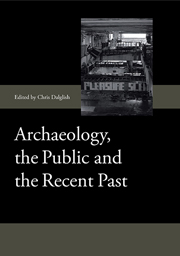Archaeologists, Power and the Recent Past
Published online by Cambridge University Press: 05 September 2013
Summary
This volume publishes a selection of the papers first presented during the Society for Post-Medieval Archaeology's conference Engaging the Recent Past in 2010. This introductory paper seeks to situate the other contributions, placing them in the context of wider processes including the rise of Community Archaeology and the development of an explicit political consciousness in archaeology. Concepts of multivocality and memory are discussed, as are the practices of public participation. The paper argues that a more critical stance needs to be taken towards public engagement in archaeology, and this is discussed in relation to concepts of power and social learning. The paper advocates a move beyond limited participation (confined to particular activities, such as participatory site identification and recording, and to the context of particular projects) and it advocates a move towards participatory governance. Here, the archaeological professional is repositioned as a collaborator engaging with others, including relevant public constituencies and the relevant authorities, in the social process of creating knowledge about the past and defining how historic environments and relationships will be protected, managed or transformed in the future.
INTRODUCTION
This volume arises from the Society for Post-Medieval Archaeology conference Engaging the Recent Past: Public, Political Post-Medieval Archaeology (Glasgow, September 2010). The focus of the conference was the contemporary context of post-medieval archaeology: the values, politics and ethics associated with the recent past, and the practices through which we engage with and construct that past. Contributors to the conference considered these issues in relation to the post-medieval and contemporary archaeologies of the U.K., Ireland and a number of other countries, and they promoted positions founded in a variety of philosophical, political and practice traditions.
- Type
- Chapter
- Information
- Archaeology, the Public and the Recent Past , pp. 1 - 10Publisher: Boydell & BrewerPrint publication year: 2013



